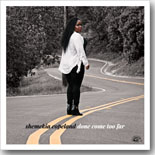|
Shemekia Copeland
Done Come Too Far
Alligator Records
|

Shemekia Copeland can
write and sing a topical blues song, covering
both current and past events, better than most
contemporary artists. And, hey, that's what the
blues should often be all about. She really
nailed it on her previous album, Uncivil War,
and now she's back on Done Come Too Far
with even more topics to get our minds thinking
about where we were and where we're at now as a
society. But she also shows the ability to make
the music fun, often bringing a smile to the
face while listening to her original
compositions. We could argue all day about who
is the most important artist on the blues scene
today, but I could easily make a case that it's
Shemekia.
As she did on Uncivil War, Ms. Copeland headed to
Nashville to record this latest album, incorporating some of that area's
sounds and instrumentation into the mix to create a more unique and
diverse blues sound not restricted by boundaries. Will Kimbrough returns
as producer after manning the helm on her two previous releases.
We get right to the power of the blues on the opening
cut, "Too Far To Be Gone," wiht Copeland singing about advancements that
have been made in the civil rights movement, notably mentioning Rosa
Parks, Martin Luther King, the freedom marchers, and more, with Sonny
Landreth driving the beat with searing slide guitar and Copeland
forcefully shouting out lines like, "... If you think we're stopping,
you've got it wrong ..." Yes, advancements have been made, but there is
still a long way to go.
"Pink Turns To Red" is the song that you will listen to
over and over, perhaps at times bringing a tear to your eye, with
Copeland telling about the ravages of gun violence. Her voice powers
over the heavy instrumentation, filling our minds and memories with
lines like, "... open season from a window above ...," "... last one in
the classroom door ...," and "... she saw the kid with the gun ..." Like
me, you will undoubtedly wonder whether she wrote this song after the
school shooting in Uvalde, Texas earlier this year, but it was actually
composed and recorded prior to that tragedy. If that doesn't make you
lament the effect of our lax gun control laws, then listen to it again
.. and again ... and again.
"The Talk" is a slow blues that could have been (and
most likely was) a real-life conversation that Copeland had with her son
about how to carry himself as a young black man. This line says it all
--- "...As sure as you're black, there's a target on your back ..." Soul
pioneer Charles Hodges contributes B-3 accompaniment here. Going back
into history is the eerie, snaky blues, "Gullah Geechee," with Cedric
Watson's African gourd banjo starting this song before Copeland sings
about the early days of slavery and then bringing it to the present with
the line, "... still trying to be free ...," showing that in many ways
slavery hasn't really ended. Following that is a slow soulful blues,
"Why Why Why," with Copeland looking for answers to questions that
perhaps can't be resolved.
Done Come Too Far turns to a lighter side after
those first five songs, with "Fried Catfish And Bibles" taking us into
Louisiana for a rollicking Cajun number, featuring Andre Michot on
accordion and Watson on fiddle. But just to keep us focused on the real
reasons for this album, Cedric Burnside joins in on guitar and vocals on
"Done Come Too Far," a slow, Hill Country blues with the requisite heavy
drum beat as the co-vocalists urge everyone to keep the civil rights
movement going. "... If you think we're stopping, you've got it wrong
..."
"Barefoot In Heaven" seems to be Copeland's view of what
heaven will be like when she gets there, especially that she anticipates
seeing and hearing Sister Rosetta Tharpe. Landreth returns with heavy
slide guitar while a background choir gives the song an appropriate
church vibe.
What follows is a totally unexpected song, "Fell In Love
With A Honky," with the press notes proclaiming it as
semi-autobiographical for Copeland. It's a real hoot, a country sound as
she sings about meeting a musician atTootsie's Orchid Lounge in
Nashville and falling for him despite their very different backgrounds.
He's playing country blues at first, but Copeland claims to convert him
from playing Hank Williams to Otis Redding, singing "... everyday he
gets a little more funky! ..." Fats Kaplin contributes pedal steel to
give this song its country sound.
"The Dolls Are Sleeping" is a pleasant tune with limited
instrumentation, leading in to a funky Memphis sound, "Dumb It Down,"
with the appropriate guitar effects by Kimbrough and keyboard playing
from Hodges. It's another humorous number, with Copeland explaining the
way to get ahead in our more vapid social media celebrity environment.
To close the album Copeland covers one of her father
Johnny's standards, "Nobody But You," but giving it a slower tempo than
the original. Kimbrough takes on the Johnny Copeland role with a killer
blues guitar solo. I truly believe that Johnny would be proud of his
daughter and everything she's accomplished in the blues world, but
especially for her version of this song.
Done Come Too Far may finish the current blues
season as the best album of the year. Shemekia Copeland has the
bloodlines, the voice and the songwriting skills to continue to thrive.
I can't wait to hear what's next from her.
--- Bill Mitchell